May 28, 2021
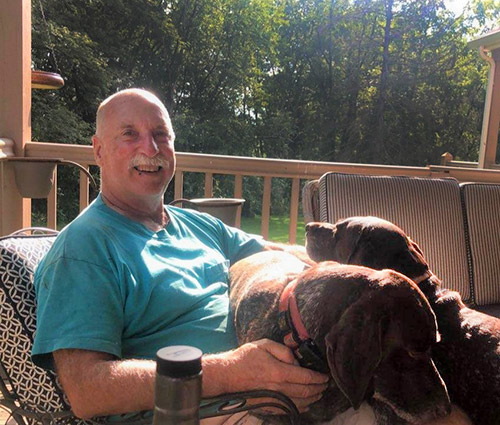
University of Maryland School of Medicine (UMSOM) Dean E. Albert Reece, MD, PhD, MBA, announced today that grateful patient David Carroll has made a generous $1 million bequest pledge in support of the Advanced Heart Failure (AHF) program in UMSOM’s Department of Medicine’s Division of Cardiovascular Medicine. This gift follows an initial five-year pledge of $5,000 made by Mr. Carroll in 2017 for operating support of the program
Through his bequest, the newly established Advanced Heart Failure Fund will support the future efforts of advanced heart failure, heart transplant, and VAD (ventricular assist devices) programs. As an unrestricted gift, the Fund will provide UMSOM’s cardiovascular medicine team with the greatest flexibility to use this support strategically to advance the changing needs of the program.
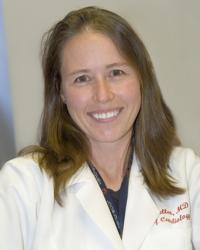 Mr. Carroll, who is retired, was originally referred to UMSOM’s Erika D. Feller, MD ’98, Assistant Professor of Medicine in the Division of Cardiovascular Medicine in 2010. At the time, he was suffering from advanced dilated cardiomyopathy, a worsening heart condition that causes the muscle in the heart’s ventricles to become weakened and unable to pump blood normally, which can lead to heart failure. Dr. Feller determined that Mr. Carroll required a heart transplant.
Mr. Carroll, who is retired, was originally referred to UMSOM’s Erika D. Feller, MD ’98, Assistant Professor of Medicine in the Division of Cardiovascular Medicine in 2010. At the time, he was suffering from advanced dilated cardiomyopathy, a worsening heart condition that causes the muscle in the heart’s ventricles to become weakened and unable to pump blood normally, which can lead to heart failure. Dr. Feller determined that Mr. Carroll required a heart transplant.
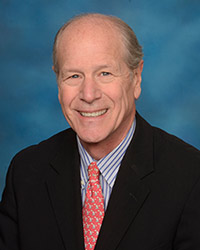 While on the transplant wait list, Mr. Carroll had a Jarvik left ventricular assist device (LVAD) implanted to help his weakened heart pump, extending his life until a donor organ was available. Improving significantly while on LVAD therapy, he was a pioneer in that early Jarvik LVAD clinical trial in which the UMSOM played an important role. In January 2012, Mr. Carroll received a donor heart and underwent life-saving heart transplant surgery performed by Bartley P. Griffith, MD, the Thomas E. and Alice Marie Hales Distinguished Professor in Transplant Surgery, and his team.
While on the transplant wait list, Mr. Carroll had a Jarvik left ventricular assist device (LVAD) implanted to help his weakened heart pump, extending his life until a donor organ was available. Improving significantly while on LVAD therapy, he was a pioneer in that early Jarvik LVAD clinical trial in which the UMSOM played an important role. In January 2012, Mr. Carroll received a donor heart and underwent life-saving heart transplant surgery performed by Bartley P. Griffith, MD, the Thomas E. and Alice Marie Hales Distinguished Professor in Transplant Surgery, and his team.
Grateful for the care he received, and the measures UMSOM physicians took to keep him alive, Mr. Carroll determined to make a legacy gift to show his deep appreciation. “There is not enough I can give to thank Dr. Erika Feller and Dr. Bartley Griffith for saving my life,” Mr. Carroll said. “Maryland has taken care of me from day one and continues to do so today. When I go there for a checkup, it’s like visiting my other family. If my bequest can just help one person, that would be great.”
“David’s generous donation underscores the dedicated, multi-disciplinary work that the University of Maryland’s heart transplant and VAD team does every day,” Dr. Feller says. “Our work is more than a job—it’s a constant desire to improve the lives of patients with severe heart failure. It involves building patient trust and providing options for advanced heart failure management. His donation will help us increase our penetration into communities.”
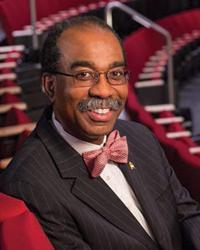 Dean Reece, who is also University Executive Vice President for Medical Affairs and the John Z. and Akiko K. Bowers Distinguished Professor, calls Mr. Carroll’s gift “transformational.” “Thanks to Mr. Carroll’s extraordinary generosity, our cardiovascular faculty have been given a new and vital springboard to seek and achieve lifesaving treatments for heart patients, now and in the future,” he said.
Dean Reece, who is also University Executive Vice President for Medical Affairs and the John Z. and Akiko K. Bowers Distinguished Professor, calls Mr. Carroll’s gift “transformational.” “Thanks to Mr. Carroll’s extraordinary generosity, our cardiovascular faculty have been given a new and vital springboard to seek and achieve lifesaving treatments for heart patients, now and in the future,” he said.
“Bequests are symbolically important to our patients in creating a legacy to honor our UMSOM departments and physicians who have changed their lives,” said Mary A. Pooton, Assistant Dean for Development. “We are extremely thankful for Mr. Carroll’s gift and the impact it will bring to elevating future care to patients with cardiovascular disease.”
To learn more about planned giving opportunities to the University of Maryland School of Medicine, click here.
About the University of Maryland School of Medicine
Now in its third century, the University of Maryland School of Medicine was chartered in 1807 as the first public medical school in the United States. It continues today as one of the fastest growing, top-tier biomedical research enterprises in the world -- with 46 academic departments, centers, institutes, and programs, and a faculty of more than 3,000 physicians, scientists, and allied health professionals, including members of the National Academy of Medicine and the National Academy of Sciences, and a distinguished two-time winner of the Albert E. Lasker Award in Medical Research. With an operating budget of more than $1.2 billion, the School of Medicine works closely in partnership with the University of Maryland Medical Center and Medical System to provide research-intensive, academic and clinically based care for nearly 2 million patients each year. The School of Medicine has nearly $600 million in extramural funding, with most of its academic departments highly ranked among all medical schools in the nation in research funding. As one of the seven professional schools that make up the University of Maryland, Baltimore campus, the School of Medicine has a total population of nearly 9,000 faculty and staff, including 2,500 students, trainees, residents, and fellows. The combined School of Medicine and Medical System (“University of Maryland Medicine”) has an annual budget of over $6 billion and an economic impact of nearly $20 billion on the state and local community. The School of Medicine, which ranks as the 8th highest among public medical schools in research productivity (according to the Association of American Medical Colleges profile) is an innovator in translational medicine, with 606 active patents and 52 start-up companies. In the latest U.S. News & World Report ranking of the Best Medical Schools, published in 2021, the UM School of Medicine is ranked #9 among the 92 public medical schools in the U.S., and in the top 15 percent (#27) of all 192 public and private U.S. medical schools. The School of Medicine works locally, nationally, and globally, with research and treatment facilities in 36 countries around the world. Visit medschool.umaryland.edu
Contact
Office of Public Affairs
655 West Baltimore Street
Bressler Research Building 14-002
Baltimore, Maryland 21201-1559
Contact Media Relations
(410) 706-5260
Related stories
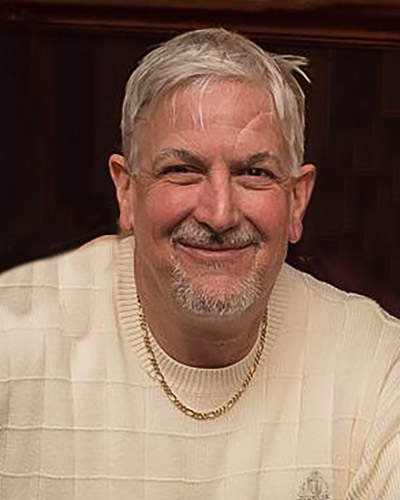
Wednesday, March 09, 2022
IN MEMORIAM: David Bennett, Sr.
David Bennett, the 57 year old patient with terminal heart disease who made history as the first person to receive a genetically modified pig’s heart, passed away yesterday on March 8. Mr. Bennett received the transplant on January 7 and lived for two months following the surgery. His condition began deteriorating several days ago. After it became clear that he would not recover, he was given compassionate palliative care. He was able to communicate with his family during his final hours.
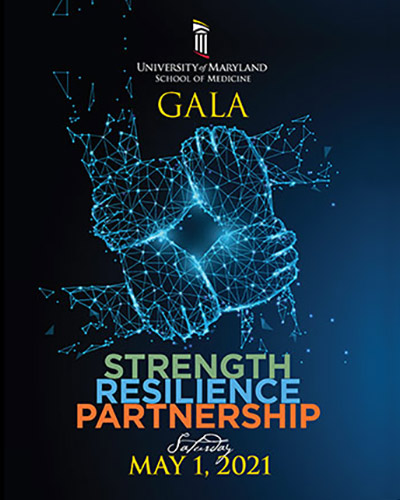
Tuesday, May 04, 2021
“Strength, Resilience, and Partnership”
Marking a previous year unlike any other, the entire University of Maryland School of Medicine community—faculty, staff, students, alumni, friends, and benefactors—gathered as one online on Saturday, May 1 for a virtual hour-long celebration of the 2021 School of Medicine Gala, which coincides annually with the Medical Alumni Association Reunion Weekend.
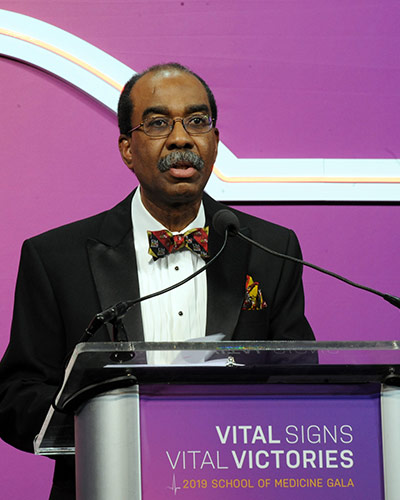
Tuesday, May 07, 2019
"Vital Signs, Vital Victories”
“Tonight, we are gathered to celebrate our many victories in medicine though the extraordinary power of collaboration.” With that greeting, E. Albert Reece, MD, PhD, MBA, Executive Vice President for Medical Affairs at UM Baltimore, John Z. and Akiko K. Bowers Distinguished Professor, and Dean of the University of Maryland School of Medicine, welcomed more than 1,000 alumni, faculty, staff, students, and other distinguished guests to the University of Maryland School of Medicine’s Annual Gala on May 4 at the Baltimore Convention Center.
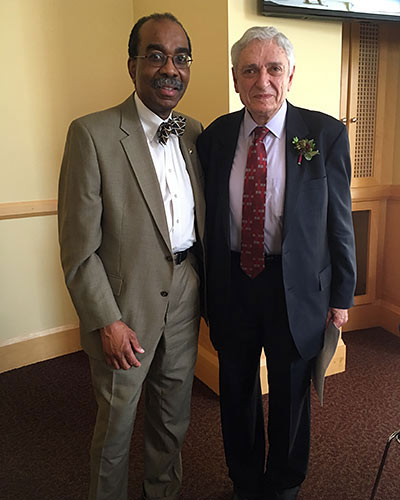
Friday, July 06, 2018
Library Recognizes Longtime Faculty Member for Rare Book Donations
On June 21, the Health Sciences and Human Services Library at the University of Maryland, Baltimore presented Mordecai Blaustein, MD, University of Maryland School of Medicine (UMSOM) professor and past chair of physiology, and his wife Ellen with the Theodore E. Woodward Award to commemorate their support of the library. Over the past three decades they have donated several important historical books to the library from their collection.
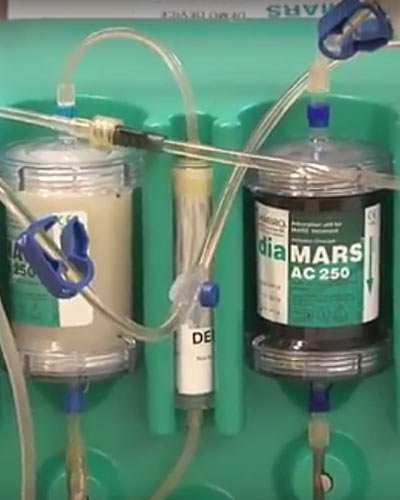
Wednesday, August 23, 2017
New Use of Blood Cleaning Device Saves High-Risk Patients With Liver Failure
Severe acute liver failure (ALF), a rare but life-threatening illness, is associated with high death rates if patients don’t receive timely treatment or a liver transplant. Unlike the heart or the kidneys, there is no established mechanical device to replace the liver’s function. Now, University of Maryland School of Medicine (UM SOM) researchers report that a device that removes toxins from the blood can also effectively provide a bridge to liver transplantation or buy time for a traumatically injured liver to heal, suggesting broader uses for the device than previously thought.
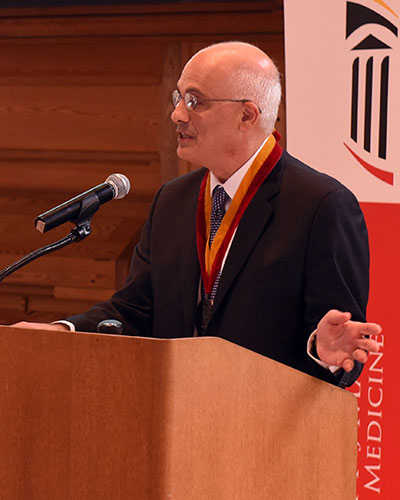
Friday, September 23, 2016
Investiture ceremony Installs Dr. Melhem as the Dean John M. Dennis Chair in Radiology
Investiture ceremonies have a way of building connections between the School’s past and present and serving as a bond between faculty, alumni, donors, and mentors across multiple generations. Such was the case on September 21, when Elias R. Melhem, MD, was installed as the Dean John M. Dennis Chair in Radiology before a large audience of family, friends and colleagues of both the benefactor and the recipient.
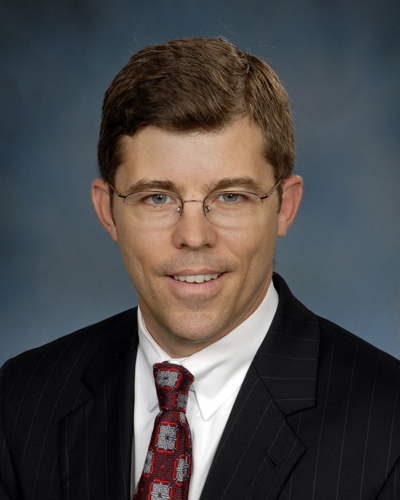
Friday, June 24, 2016
Surgical First: Patient Avoids Dialysis Thanks to Simultaneous Polycystic Kidney Removal and Kidney Transplant During 28-Person Kidney Swap
In a first-of-its-kind procedure in the United States, a patient was able to avoid dialysis when surgeons simultaneously removed two diseased kidneys and also transplanted a kidney from a living donor – all as part of a 28-person paired kidney exchange (PKE). The procedure, performed in May on a patient with polycystic kidney disease (PKD), eliminated the need for the patient to ever undergo dialysis.
